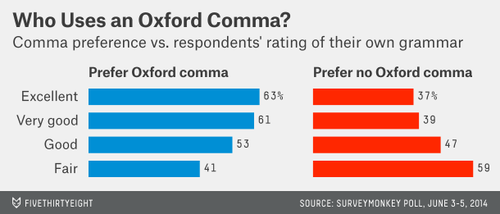Sandbox: Difference between revisions
| Line 10: | Line 10: | ||
<center>[[File:Hickey-OxfordComma.png | 500px]]</center> | <center>[[File:Hickey-OxfordComma.png | 500px]]</center> | ||
Lest you get the impression that | Lest you get the impression that this is simply a matter of taste, see [http://mentalfloss.com/article/33637/best-shots-fired-oxford-comma-wars The best shots fired in the Oxford comma wars]. Among the amusing examples there: | ||
<blockquote> | <blockquote> | ||
'''Pro:''' "She took a photograph of her parents, the president, and the vice president."<br> | '''Pro:''' "She took a photograph of her parents, the president, and the vice president."<br> | ||
| Line 18: | Line 18: | ||
This example from the 1934 style book of the New York Herald Tribune shows how a comma before "and" can result in a lack of clarity. With the comma, it reads as if Mr. Smith was the donor of the cup, which he was not. | This example from the 1934 style book of the New York Herald Tribune shows how a comma before "and" can result in a lack of clarity. With the comma, it reads as if Mr. Smith was the donor of the cup, which he was not. | ||
</blockquote> | </blockquote> | ||
Submitted by Paul Alper | Submitted by Paul Alper | ||
Revision as of 19:20, 14 July 2014
The Oxford comma: A Pressing issue?
Elitist, superfluous, Or popular? We polled Americans on the Oxford comma
By Walt Hickey, FiveThirtyEight, 17June 2014
A grammatical point of controversy: should you use a comma before the "and" in a list of more than two items? As reported in the article:
We asked respondents which sentence was, in their opinion, more grammatically correct: “It’s important for a person to be honest, kind and loyal.” Or: “It’s important for a person to be honest, kind, and loyal.” The latter has an Oxford comma, the former none.
Among 1,129 Americans responding, the Oxford comma was preferred, 57% to 43%. Interestingly, those in favor tended to have a higher opinion of their own grammatical skills, as shown in the accompanying graph

Lest you get the impression that this is simply a matter of taste, see The best shots fired in the Oxford comma wars. Among the amusing examples there:
Pro: "She took a photograph of her parents, the president, and the vice president."
This example from the Chicago Manual of Style shows how the comma is necessary for clarity. Without it, she is taking a picture of two people, her mother and father, who are the president and vice president. With it, she is taking a picture of four people.
Con: "Those at the ceremony were the commodore, the fleet captain, the donor of the cup, Mr. Smith, and Mr. Jones."
This example from the 1934 style book of the New York Herald Tribune shows how a comma before "and" can result in a lack of clarity. With the comma, it reads as if Mr. Smith was the donor of the cup, which he was not.
Submitted by Paul Alper
Reproducibility
When studies are wrong: A coda
by George Johnson, New York Times, 7 March 2014
Submitted by Bill Peterson
Finding lost aircraft
How statisticians found Air France Flight 447 two years after it crashed into Atlantic
MIT Technology Review, 27 May 2014
How statisticians could help find that missing plane, by Carl Bialik, FiveThirtyEight, 17 March 2014
Missing Malaysia Airlines jet shines spotlight on tracking technology
Submitted by Jeanne Aolbert